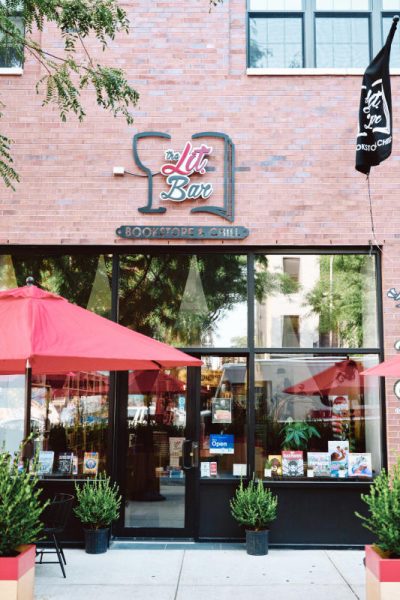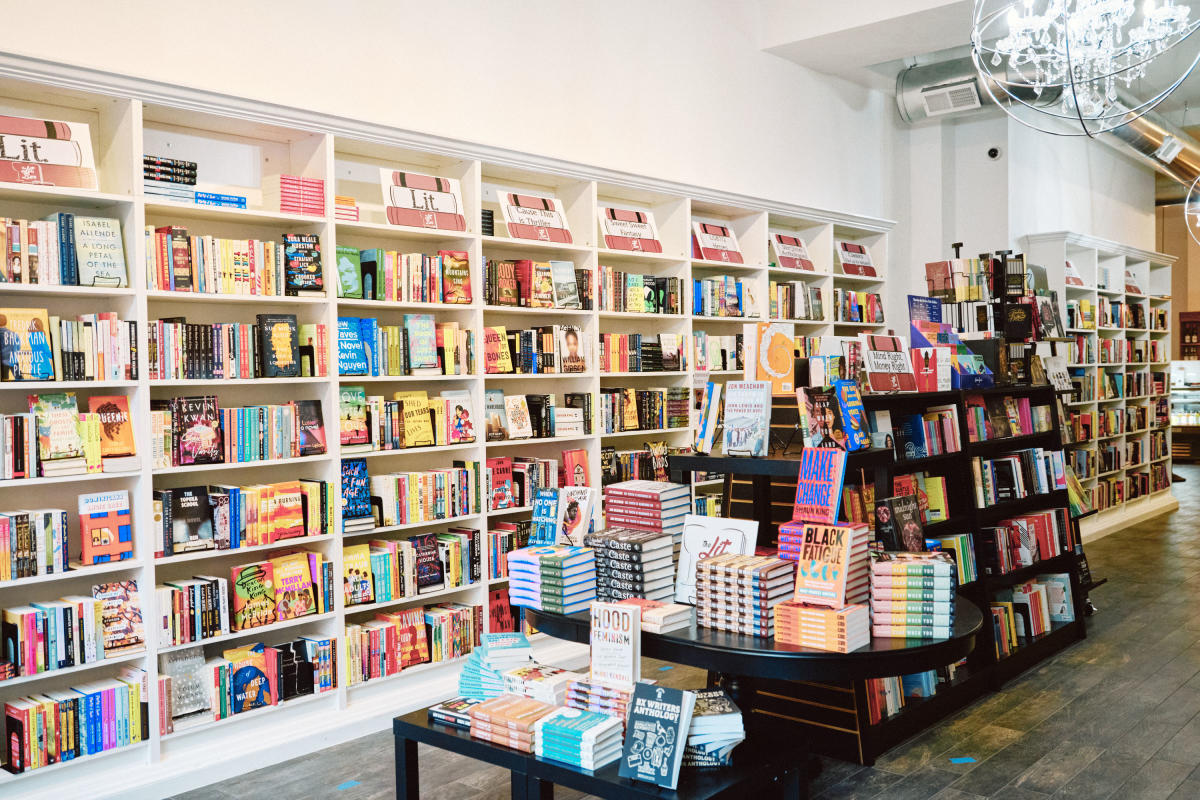To any book lovers in the Bronx wishing to avoid the monotony of Amazon’s book web page and hoping to socialize, simply head down to your local bookstore. There’s just one small catch: the Bronx’s “local bookstore” is shared by all 1.4 million people living in the borough. There is only one.
The Lit. Bar, owned and operated by Noëlle Santos in Mott Haven, is a welcoming bookstore, representing the Bronx. It opened on National Independent Bookstore Day, on April 27th, 2019, and since this time, the store has since become a beacon of hope for the return of independent and sustainable bookstores in New York City.
After the last Bronx Barnes & Noble location closed in 2016, there was a vacancy for a brick and mortar store, Santos saw an opportunity to help her home borough. She resolved to open a bookstore that would help the underserved communities of the Bronx and curate a store that was representative of the area.
This was no simple task. In a conversation with Santos, I learned that the catalyzing force for her career change began with putting her signature on a petition to stop the closing of her childhood Barnes & Noble.
I was fortunate enough to meet and talk with Santos about her store, and parts of this interview are included throughout the article.
Growing up in Soundview, the Bronx, Noëlle Santos had always measured her success in achieving a life for herself outside of the Bronx. She made her way through a Bachelor’s and a Master’s degree at Lehman College before becoming a human resources and payroll director. For a while, it seemed that Santos had made it – she accomplished her goal of ‘making it out’ of her home borough – until a petition to save a crucial part of the Bronx was shared with her.
After fifteen years of dutiful service as the sole bookstore in the Bronx, a Barnes & Noble in Bay Plaza Mall, was set to close. Soaring rent prices, increased online book sales, and the rising popularity of eBooks, had forced the chain store to consider closing, the result of which was 1.4 million people being left without an accessible, long-term bookstore to call their own.
In response to the closing, the borough fought hard to avoid it and raised its voice with thousands of people signing petitions and protesting for Barnes & Noble to remain open. Eventually, a deal was reached with the landlord and Barnes & Noble to extend the lease for two more years while other options were being explored.
“I felt like a coward,” recalled Santos in reference to simply signing the petition and moving on. She knew that she could do more to help the Bronx. Then, an idea hit her. She would open her own bookstore. From that moment on, Santos dedicated herself to making this dream a reality, by attending classes on independent businesses, volunteering at local bookstores, and researching book store business models, all the while working full time as a HR specialist.
Eventually, Santos decided on creating a bookstore with a wine bar attached, allowing people to look and to buy books, while also providing a space for socializing. The store also provides a hangout for students. Arianna Sheehy ’25, secretary of the Bronx Science Book Club and a Bronx local, believes that having an area to go to after browsing books makes “the whole experience much more fun,” noting that, “we get to hang out and talk after buying the books.”
When the day finally came that Barnes & Noble had to close, Noëlle Santos was prepared. On June 2nd, 2016, Santos submitted plans to NYPL’s NY StartUp! Business Plan Competition in the hopes of attaining some of the funding needed to open her bookstore, The Lit. Bar. The proposal won second place for a grant of $7,500.

The grant, in addition to crowdfunding, allowed Santos to open The Lit. Bar on April 27th, 2019; also in a poetic turn of events, this was Independent Bookstore Day. Its permanent location in Mott Haven, the Bronx, allows for an easy stop in a person’s commute. This combats the common issue in the Bronx which Sheehy presented: “everything is far away which takes time to travel to, which also stops some people from going in the first place.” Santos has worked tirelessly to combat this issue throughout her career.
“I lit my life on fire in order to open this bookstore,” said Santos, while talking about her shift from working on Wall Street to running an independent bookstore. In her childhood, it seemed the goal for everyone was to ‘escape’ the Bronx and climb the corporate ladder, which is what she did. Santos’ life is intrinsically linked to the development of bookstores in the Bronx, and her work towards this cause has been monumental.
After Santos heard about the closure of the Barnes & Noble, she looked to politicians and local representatives in order to alleviate the situation. When they didn’t act, she realized that it was the local community who should be the ones to help the Bronx. Kadhiza Chowdhury ’25, media manager for the Book Club, states how the lack of bookstores was unsettling, making “books less accessible, something that shouldn’t be something happening in the world of today.”
When first planning for The Lit. Bar, Santos had never been to an independent bookstore, “That Barnes & Noble was all I knew [regarding how a bookstore could operate].” This led her to work apprenticeships in independent bookstores and to look to different business models for inspiration. The Lit. Bar operates as a book selling vendor and a wine bar, something not often seen in bookstore-combinations.
When researching and keeping customers in mind, Santos noticed that the cost of ordering books and supplies was difficult to sustain at a local level. So, to offset this, a wine bar with drinks and snacks reduced the store’s financial burdens. Additionally, having space to hold events gave her a competitive edge, allowing her to promote authors and publishers.
Noëlle Santos considers herself to be her target audience with the store. She wanted the store to replicate her ideal reading environment: a comfortable place, with a snack or glass of wine also available. This setup also allows for others to enjoy their reading in the store rather than reading isolated at home. “I wanted to make this a social place for people to gather formally, as well as informally, as a community,” said Santos.
That is just what The Lit. Bar has become, hosting many readers each day in an ideal reading environment, with Santos herself working in the store every day. The proprietress thought she would hold an absentee role in the bookstore and retain her former job, only occasionally checking in. However, support for the store was overwhelming and prompted her to devote all of her time to the store. It has been tumultuous and surprising. As Santos said, “Coming up, I didn’t know [that owning a bookstore] could be a career option.”
Now that Santos is a part of the dwindling community of independent bookstore owners in New York City, she sees the obstacles to owning such a niche business. Since opening The Lit. Bar, Santos has tried mentoring others to open more bookstores, working with them to overcome the main obstacle: funding. For Santos and independent business owners, the solution to this hurdle has been in connecting with the community, as her store has done. The Lit. Bar was mainly financed through crowdfunding by Bronx residents, ensuring that the store could survive.
Turning book buying into a social experience seems to be key to surviving in the current, expensive economy of New York City. Creating memories is how stores like Santos’ can survive, as she explains it, “as long as retail adapts to be more than just going in and buying a book.” Santos is creating an experience much greater than the one-click purchase. There will always be an innate desire to make connections, which just needs to be expanded into stores, so that the stores become part of a community.
The issue of accessible bookstores in the Bronx is what touched Santos’ heart and led to the creation of the distinct and impactful bookstore that caters to the entire borough. Santos said, “the book desert in the Bronx is just the latest headline.” Places like The Lit. Bar, based on solidarity, are invaluable as inspiration to aspiring small businesses. Creating communal connections and knowing that, “put together we are strong,” is what can lead to a future Bronx that provides for its people.
In Santos’ opinion, “What this has become, is something much larger than I ever anticipated.”
The issue of accessible bookstores in the Bronx is what touched Santos’ heart and led to the creation of the distinct and impactful bookstore that caters to the entire borough. Santos said, “the book desert in the Bronx is just the latest headline.” Places like The Lit. Bar, based on solidarity, are invaluable as inspiration to aspiring small businesses. Creating communal connections and knowing that, “put together we are strong,” is what can lead to a future Bronx that provides for its people.

